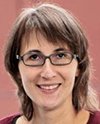Discover a fresh, novel, and exciting perspective upon scientific research in an academic setting: job sharing at a leadership position. This new leadership management approach (also relevant for men) can bring academic success with an optimal work-life balance at the top professional level. A solution for more women to access top management positions?
Interview with Prof. Rothen-Rutishauser, Adolphe Merkle Institute, University of Fribourg
You co-lead a chair in BioNanomaterials together with Prof. Alke Fink. Could you give us an insight into how is job sharing at a professorial level working? How is leading a group with two heads feasible and what is the impact?
The BioNanomaterials Chair at the Adolphe Merkle Institute in Fribourg is shared equally between me and my colleague, Prof. Alke Fink. The motivation to apply together was to acquire a leadership position within academia while still achieving an optimal work-life balance with part-time employment. We had already collaborated together for several years when we saw the position being advertised. With our complementary profiles – I am a cell biologist by training, Alke is a materials engineer – we convinced the appointments committee of the immediate benefit of a shared professorship.
Today we lead a group of 25 people, mainly postdocs and PhD students. All our interdisciplinary projects are at the bio-nano-interface and everybody in the group profits from our two different scientific backgrounds. This is also important for Alke and me. We have learned so much – and still do – from each other, allowing us to tackle new scientific questions completely differently to what we did some years ago. Our success is also reflected by the 80 scientific publications published jointly and more than CHF 4 million of external funding obtained.
“Communication” is the key for the success of such a partnership, as well as team spirit, requiring a lot of time and effort from everybody. The advantages, such as shared responsibilities, representation of each other in the case of absences and having a bigger network, clearly outweigh any disadvantages. With the experience we have gained, we encourage young (female & male) students to follow their own creative paths!
 Barbara Rothen-Rutishauser received her PhD in Cell Biology at the ETH Zurich in 1996. From 1996 to 2000, she held a postdoctoral position in Biopharmacy at the Institute of Pharmaceutical Sciences at the ETH. In 2000, she joined Prof. Gehr’s group at the Institute of Anatomy, University of Bern. She has become an expert in the field of cell-nanoparticle interactions in the lung. In 2011, she became an independent group leader at the Department of Clinical Research of the Bern University Hospital. Since 2011, she co-leads the chair in BioNanomaterials at the Adolphe Merkle Institute, University of Fribourg, with Prof. Alke Fink. Their lab is part of the NCCR Bioinspired Materials network.
Barbara Rothen-Rutishauser received her PhD in Cell Biology at the ETH Zurich in 1996. From 1996 to 2000, she held a postdoctoral position in Biopharmacy at the Institute of Pharmaceutical Sciences at the ETH. In 2000, she joined Prof. Gehr’s group at the Institute of Anatomy, University of Bern. She has become an expert in the field of cell-nanoparticle interactions in the lung. In 2011, she became an independent group leader at the Department of Clinical Research of the Bern University Hospital. Since 2011, she co-leads the chair in BioNanomaterials at the Adolphe Merkle Institute, University of Fribourg, with Prof. Alke Fink. Their lab is part of the NCCR Bioinspired Materials network.


Leave a comment
The editors reserve the right not to publish comments or to abridge them.